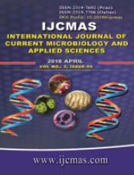


 National Academy of Agricultural Sciences (NAAS)
National Academy of Agricultural Sciences (NAAS)

|
PRINT ISSN : 2319-7692
Online ISSN : 2319-7706 Issues : 12 per year Publisher : Excellent Publishers Email : editorijcmas@gmail.com / submit@ijcmas.com Editor-in-chief: Dr.M.Prakash Index Copernicus ICV 2018: 95.39 NAAS RATING 2020: 5.38 |
The use of probiotic bacteria in novel foods to provide beneficial health effects is gaining interest in the food industry. Microencapsulation technology can be used to maintain the viability of probiotic bacteria during food product processing and storage. The present study was an attempt to develop efficient symbiotic microencapsulation method for increased stability and viability of probiotics under refrigerated storage as well as simulated gastrointestinal conditions to confer health benefits to the host using sodium alginate and chitosan as coating biomaterial using extrusion technique. A comparative study between free and encapsulated cells with respect to their viability and stability under these conditions was carried out. The encapsulated cells showed a higher viability compared to free cells on storage at 4ºC for 7 days. Encapsulated probiotics also showed an improved percentage survival in Simulated Gastric Juice (pH 2) and Simulated Intestinal Juice (pH 8). Microencapsulation of probiotics offers an effective way of delivering viable bacterial cells to the digestive tract and maintaining their survival during refrigerated storage.
 |
 |
 |
 |
 |